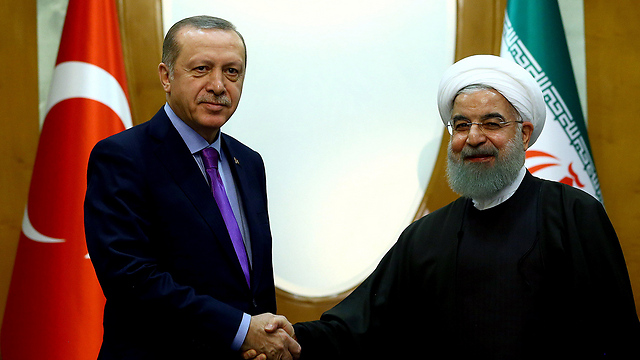
History won’t end after the next war
Op-ed: Israel is once again failing to properly consider the implication of its alliance with the weakening side of the battle taking place in our region, the Arab Sunni states, while its two main enemies—Iran and Turkey—are only growing stronger.
These developments have overturned the “alliance of minorities” policy developed by Israel diplomacy in the first decades of its existence. In light of its neighbors’ enmity, it searched for—and often found—secret and open allies which weren’t Sunni or Arab. That’s how we connected with Iran during the Shah era, with Turkey in the era before the religious awakening, with the Kurds in Iraq, with Ethiopia under Christian rule and with the Maronites in Lebanon.
Now, our friends are some of the countries bordering on Israel, while our enemies are the two big countries in the outer circle.

Fostering a friendship with your enemies’ enemies is a self-explanatory move which has provided us with many advantages, and it seems to me that only in one case—the alliance with the Christians in Lebanon—the losses exceeded the gains. We lost many people there, invested major resources, stirred up the Shiites, and likely sped up Hezbollah’s takeover of the neighboring country. This loss was basically the result of our association with the weakening element rather with the intensifying element. Our policy didn’t take into account the Christians’ demographic inferiority, the splits in their camp and their corruption.
The impact of Lebanon’s demography could have been predicted, but the influence of the other figures was obviously hard to predict, so we can forgive the national assessors for making wrong predictions. The problem is they didn’t even deal with it. The Shiites and their ties to Iran weren’t mentioned in the heated debates the preceded the first Lebanon War, or even in the following years.
Our entanglement in Lebanon is an example of ignoring an implicit future, which may require a change of paradigm. I’m not saying that the constraints of the present may be forcing us into a behavior characterized by responding to urgent challenges. I’m saying that we have to deal with long-term thoughts, because history won’t end after the next war.
I’m referring to the concern that we’re once again failing to properly consider the implication of our alliance with the weakening side of the battle taking place in our region. The weakening side is the Arab Sunni states, while the growing, energetic and promising side is Iran and Turkey. Their advantage stems from their location on the map, from their economic potential, from the size of the class of educated people among their populations, and from the sense of mission they are driven by. Moreover, despite the Iranian and Turkish leaders’ enmity towards the West, their nations are more open to the modern spirit more than the Arab Sunni states.

The weakness of “our side” is clear. Egypt is in a terrible state and its future appears disastrous. Here are a few figures: Nearly 100 million people are crowded together within a strip that makes up about 2 percent of the country; the birthrate, which has dropped, is growing again; about 40 percent of the workforce works in agriculture, which is completely dependent on a river with polluted and waning water; the industrialization rate is extremely slow, and one of the reasons is the illiteracy of half of the population; academic education has hit rock bottom; most young Egyptians are unemployed; the army manages half of the economy, and its failure as a fighting force is demonstrated in the poor battle it is waging in Sinai; most of the population supports the Sharia rule, and most of them are in favor of killing of heretic Muslims; Egypt is at the 106th place in the global Human Development Index.
As for our other friend, Saudi Arabia, some are pinning their hopes on the changes taking place there, inspired by the radiant crown prince, Mohammad bin Salman. At the moment, however, this absolute monarchy is living in the Middle Ages. Even if the anticipated processes do take place there, even if it is spared the violence involved in radical social changes, it will take generations before it becomes a modern and strong country.
Reality has brought us together with miserable friends, but I’m not so sure we’re doing enough to change the stance of our strong enemies, who are only growing stronger.










